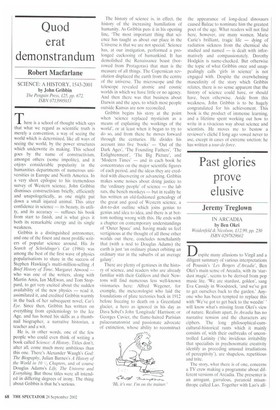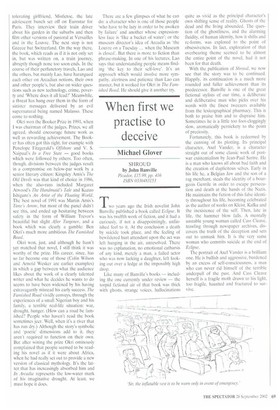Past glories prove elusive
Jeremy Treglown
IN ARCADIA by Ben Okri Weidenfeld & Nicolson, £12.99, pp. 230 ISBN 0297829602 Despite many allusions to Virgil and a diligent summary of various interpretations of Poussin's 'Les Bergers d'Arcadie', Ben Okri's main sense of Arcadia, with its 'stardust magic', seems to be derived from pop music lite. 'We are stardust, golden', sang Eva Cassidy in Woodstock, 'and we've got to get ourselves back to the garden.' Anyone who has been tempted to replace this with 'We've got to get back to the weedin" will know what's missing from Okri's view of nature. Realism apart, In Arcadia has no narrative tension and the characters are ciphers. The long philosophical-cumcultural-historical rants which it mainly consists of, with their outbreaks of uncontrolled Latinity ('the invidious irritability that specialists in psychosomatic creativity identify as preceding unusual irradiations of perceptivity'), are shapeless, repetitious and trite.
The story, what there is of one, concerns a TV crew making a programme about different versions of Arcadia. The presenter is an arrogant, garrulous, paranoid misanthrope called Lao. Together with Lao's all tolerating girlfriend, Mistletoe, the late adolescent bunch set off on Eurostar for Paris. They interview their train driver about his garden in the suburbs and then film other versions of pastoral at Versailles and in the Louvre. The next stop is not Greece but Switzerland. On the way there, the book, which reads as if it is not only set in, hut was written on, a train journey, abruptly though none too soon ends. In the course of their perfunctory travels, Lao and the others, but mainly Lao, have harangued each other on Arcadian notions, their own and other people's, but also on wider questions such as new technology, crime, poverty and 'Where does it all lead?' Meanwhile, a threat has hung over them in the form of sinister messages delivered by an evil supernatural being named Malasso. These come to nothing.
Okri won the Booker Prize in 1991, when I was chairman of the judges. Prizes, we all agreed, should encourage future work as well as rewarding achievement, The Booker has often got this right, for example with Penelope Fitzgerald's Offshore and V. S. Naipaul's In a Free State — good books which were followed by others. Too often, though, divisions between the judges result in a compromise on below-par work by a senior literary citizen; Kingsley Amis's The Old Devils was that kind of choice in 1986, when the also-rans included Margaret Atwood's The Handmaid's Tale and Kazuo Ishiguro's An Artist of the Floating World. The best novel of 1991 was Martin Amis's Time's Arrow, hut most of the panel didn't see this, and ended up hesitating between safety in the form of William Trevor's beautiful but slight After Turgenev, and a book which was clearly a gamble: Ben Okri's much more ambitious The Famished Road.
Okri won, just, and although he hasn't yet matched that novel, I still think it was worthy of the prize. His career, since, has so far become one of those (Colin Wilson and Arnold Wesker are earlier examples) in which a gap between what the audience likes about the work of a clearly talented writer and what he decides he wants to do seems to have been widened by his having extravagantly misread his early success. The Famished Road vividly conveys, through the experiences of a small Nigerian boy and his family, a terrible real-life situation: war, drought, hunger. (How can a road be famished'? People who haven't read the book sometimes jeer. Well, when it's a river that has run (IT.) Although the story's symbolic and 'poetic' dimensions add to it, they aren't required to function on their own. But after wining the prize Okri ominously complained that people seemed to be reading his novel as if it were about Africa, when he had really set out to provide a new version of classical mythology. It's the latter that has increasingly absorbed him and In Arcadia represents the low-water mark of his imaginative drought. At least, we must hope it does.
There are a few glimpses of what he can do: a character who is one of those people 'who have to be lazy in order to be awoken by failure' and another whose expressionless face is 'like a bucket of water'; or the museum director's idea of Arcadia as the Louvre on a Tuesday ... when the Museum is closed'. But there is more to fiction than phrase-making. In one of his lectures, Lao says that understanding people means finding the key to their self-love'. It's an approach which would involve more sympathy, alertness and patience than Lao can muster, but it worked for Okri in The Famished Road. He should give it another try.



































































































 Previous page
Previous page